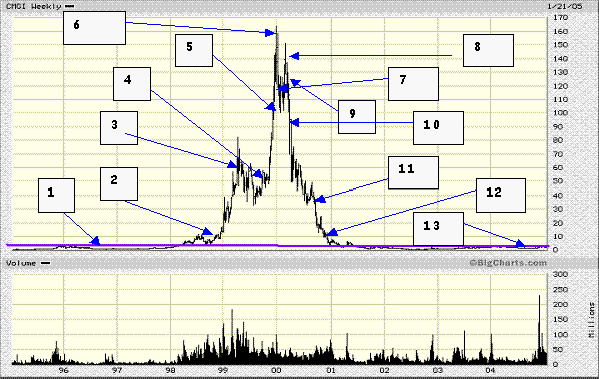
Stock Market Psychology for Dummies: If you have common sense then Mass Psychology is easy to grasp
If you understand how the mass mindset operates it provides you with an edge when it comes to investing in the stock market. The odds are stacked against the individual investor so that any trading advantage one can obtain, should be embraced. The idea behind the psychology for dummies article was to create a visual representation of the mass mindset in investing known as market psychology, and the chart below captures the thoughts that go through the mind of the average Joe. The herd mentality or Pack mentality should never be embraced; one you are part of the pack you virtually guaranteed to lose.
The masses never seem to learn from history, and sadly are doomed to relive these events again and again. It is reminiscent of the movie “Ground hog’s day”, where the main character is condemned to relive in each day again and again for eternity. However, fortunately, he manages to find the cure to his problem. Sadly this option is not available to the masses as they do not even recognise the problem. Over 80% of the solution to any problem is identifying the problem.
Market Psychology for Dummies; Graphic representation of the Mass Mindset in Action

- The stock is going nowhere; its pure junk, let me look at something else.
- Lucky break, it’s going to crash definitely.
- What, it’s still going up! Earnings are not so good, people are getting carried away, it’s going to pull back and crash.
- Ahh, see I knew it was going to crash, thank God I did not buy. (Mistake the mass mindset misses the main point here. Yes, it pulled back but look where the pull back ended–miles away from its first breakout. A losers mind can only see the picture for what it is not, by replacing it with a picture from his or her imagination. Since they live in a losing sphere, they focus on the negative aspects but not on the positive aspects.
- What happened here; this stock was supposed to crash, how the hell did it get here? Perhaps I should have bought; I could have made a lot of money; this looks like a sure thing. (So only halfway through stage 5 will the mass mindset decide it’s safe to venture out.

- Now, this person finally musters the courage to buy.) Wow, it went up, great, I’m making money.
- This stock is going to go to the moon; let me tell all my friends about it; it looks like a sure thing.
- What happened? It pulled back. Ahh, I am not going to fall for this like I fell for it last time (look at number 4). Time to buy more, buy on the dip, that’s it.
- I knew it, it’s going up, and I made more money, wish I had bought more. Next time I will invest more on the pull back. (Notice the loser’s mindset does not bother to take the time to see that the stock did not put in a new high. All that matters is that it went up.)
- It’s going down again, time to load up; I don’t want to lose this opportunity. Earnings are great, so it must be a good time to buy some more.
- The first dose of bad news and the stock takes a big hit; okay, this is just temporary; it’s going to go back up. (Blind faith huge mistake, one of the main ingredients of a losing mindset). Let me buy more and average down.
- Maybe I should sell now as the outlook does not look that great, but maybe things will improve. Let me just hold for a bit longer. Yeah, things have to change. Look how fast this stock went up; additionally, it has pulled back so much. The worst is over; it has to go up.
- This stock is dead; I have to get out. Secondly, it looks like it’s not going anywhere (this is when the stocks start to bottom. The secret programmed desire to lose syndrome has completed its mission. Trader is in a state of extreme distress and shell-shocked). I am never going to look at this or any stock like this again. Moreover, comparatively speaking I knew it was garbage. Why did I ever buy it in the first place? The stock starts to put in slow base formations and the possible start of a new uptrend. Moreover, the worst part is that this trader is no longer in the market. Lastly, he let panic get the better of him and bailed out just when he should have been buying.
Stock Market Psychology for Dummies final thoughts 
Take a close look at the above picture, for it clearly illustrates the mass mindset in action. The masses never learn, they will always be used as cannon fodder as that is the role they secretly wish for. Remember the saying “misery loves company, but stupidity simply adores it” The masses always dump when they should be buying and buy when they should be selling.
Nothing in this world comes easy for if it did, it was not worth it in the first place. A little work and patience are all that are needed to overcome the fear necessary to break away from the masses. In this world, it’s not what you know that can hurt you, it’s what you think you know but don’t that hurts you the most. We hope you find this psychology for dummies article useful.
Published courtesy of the Tactical Investor
The Art of Cutting Your Losses
One of the most enduring sayings on Wall Street is “Cut your losses short and let your winners run.” Sage advice, but many investors still appear to do the opposite, selling stocks after a small gain only to watch them head higher, or holding a stock with a small loss, only to see it lose even more.
No one will deliberately buy a stock that they believe will go down in price and be worth less than what they paid for it. However, buying stocks that drop in value is inherent to investing. The objective, therefore, is not to avoid losses but to minimize losses. Realizing a capital loss before it gets out of hand separates successful investors from the rest. In this article, we’ll help you stand out from the crowd and show you how to identify when you should make your move.
Holding Stocks With Large Losses
In spite of the logic for cutting losses short, many small investors are still left holding the proverbial bag. They inevitably end up with a number of stock positions with large unrealized capital losses. At best, it’s “dead” money; at worst, it drops further in value and never recovers. Typically, investors believe the reason they have so many large, unrealized losses is that they bought the stock at the wrong time. They may also believe that it was a matter of bad luck, but seldom do they believe it is because of their own behavioral biases. Read more
Why People Lose Money in the Market?
Many new investors have found that, soon after buying their first stock, its value dropped by half. It makes for a disappointing introduction to the world of investing, but it can also prove to be a valuable wake-up call, inspiring you to learn everything you can about investing in the markets. While investing in financial markets over the long-term is an excellent path to wealth, it’s not unusual to experience occasional losses as investment values go up and down
Here’s what you need to know about why people lose money in the market—and how you can bounce back from a loss in your portfolio
Not Understanding Market Cycles
People often lose money in the markets because they don’t understand economic and investment market cycles. Business and economic cycles expand and decline. The boom cycles are fostered by a growing economy, expanding employment, and various other economic factors. As inflation creeps up, prices rise, and GDP growth slows, so too does the stock market decline in value.
Investment markets also rise and fall due to global events. After 9/11 the stock market fell 7.1 percent, the biggest one-day loss in the exchange. By Friday, September 15, 2001, the New York Stock Exchange had dropped 14 percent while the Dow Jones and the S&P 500 fell 11.6 percent. Read more
